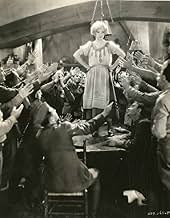IMDb RATING
6.0/10
1.3K
YOUR RATING
During World War I, a young French woman struggles to choose between two suitors: a blind soldier to whom she is engaged and an American serviceman.During World War I, a young French woman struggles to choose between two suitors: a blind soldier to whom she is engaged and an American serviceman.During World War I, a young French woman struggles to choose between two suitors: a blind soldier to whom she is engaged and an American serviceman.
- Awards
- 3 wins
Ernie Alexander
- One of the Doughboys
- (uncredited)
Oscar Apfel
- Maj. Russart
- (uncredited)
John Carroll
- Doughboy
- (uncredited)
Drew Demorest
- Doughboy
- (uncredited)
Sherry Hall
- Soldier in Russart's Office
- (uncredited)
Seymour Kupper
- Teen-Age Boy
- (uncredited)
George Magrill
- Military Policeman
- (uncredited)
Douglas Scott
- Sylvestre
- (uncredited)
Harry Tenbrook
- Doughboy
- (uncredited)
Storyline
Did you know
- TriviaFirst shot as a silent film (which exists), this was recast and re-shot as an all-talkie film. The silent version was released overseas and on a very limited basis domestically.
- GoofsThe soldiers ask Marianne to imitate Maurice Chevalier, so she sings "Louise." That song was written in 1929, more than a decade after WWI ended.
- Alternate versionsAlthough two versions of this film were shot, a talkie and a silent, and both of them exist, there was also a third version that MGM used to show this film in Argentina. The majority of the footage was lifted from the silent version (with an added soundtrack with music and effects) and all of the songs from the sound version were also included.
- ConnectionsEdited from The Big Parade (1925)
- SoundtracksLa Marseillaise
(1792) (uncredited)
Written by Claude Joseph Rouget de Lisle
Played after French mobilization for World War I
Featured review
French farm girl MARIANNE has constant difficulties with the American soldiers stationed in her barn after the Armistice.
This film was the starring talkie debut for Marion Davies, one of the most charming and talented actresses of her day. As the mistress of William Randolph Hearst, one of America's most powerful men, Davies probably could have had her pick of roles. In some respects, MARIANNE is an odd choice. There is virtually no action, most of the scenes take place in a kitchen and a barn, and Davies speaks her entire dialogue, often in French, with a very thick accent. But she is so lively and full of joie de vivre, so infectiously good-natured even when angry, even mimicking Chevalier & Bernhardt, and impersonating a young male officer, that she becomes the main reason for watching the film today. It is indeed unfortunate that Marion Davies' gifts have become obscured and her films nearly forgotten.
Lawrence Gray, who had shown much skill as a comic actor during Silent days and had worked with Davies then, here plays the American doughboy who falls for Marion. The funny business is handled by two of MGM's newest acquisitions, Yiddish dialect comedian Benny Rubin and ukulele-playing Cliff Edwards. Marion's noble French boyfriend is enacted by George Baxter.
As with many other early sound films, the movie suffers with too much talk. However, the recurring musical sequences are mostly quite welcome. The opening scene, with its idyllic look at Marion's village, shows the quality of art direction for which MGM was famous.
And pity the poor pig Anatole!
This film was the starring talkie debut for Marion Davies, one of the most charming and talented actresses of her day. As the mistress of William Randolph Hearst, one of America's most powerful men, Davies probably could have had her pick of roles. In some respects, MARIANNE is an odd choice. There is virtually no action, most of the scenes take place in a kitchen and a barn, and Davies speaks her entire dialogue, often in French, with a very thick accent. But she is so lively and full of joie de vivre, so infectiously good-natured even when angry, even mimicking Chevalier & Bernhardt, and impersonating a young male officer, that she becomes the main reason for watching the film today. It is indeed unfortunate that Marion Davies' gifts have become obscured and her films nearly forgotten.
Lawrence Gray, who had shown much skill as a comic actor during Silent days and had worked with Davies then, here plays the American doughboy who falls for Marion. The funny business is handled by two of MGM's newest acquisitions, Yiddish dialect comedian Benny Rubin and ukulele-playing Cliff Edwards. Marion's noble French boyfriend is enacted by George Baxter.
As with many other early sound films, the movie suffers with too much talk. However, the recurring musical sequences are mostly quite welcome. The opening scene, with its idyllic look at Marion's village, shows the quality of art direction for which MGM was famous.
And pity the poor pig Anatole!
- Ron Oliver
- Jun 16, 2005
- Permalink
Details
- Release date
- Country of origin
- Languages
- Also known as
- Buddies
- Filming locations
- Production companies
- See more company credits at IMDbPro
- Runtime1 hour 51 minutes
- Color
- Aspect ratio
- 1.20 : 1
Contribute to this page
Suggest an edit or add missing content




































